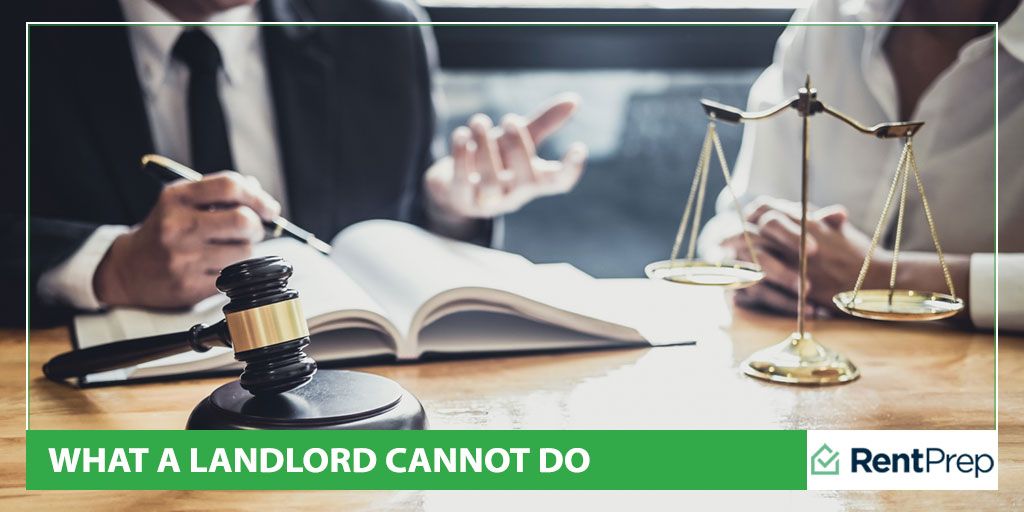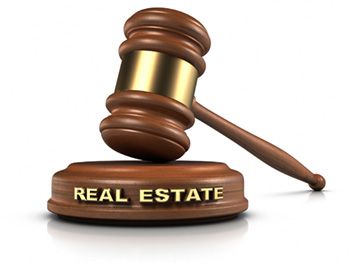
There’s a common misconception that landlords wield more power than tenants when it comes to rentals. While there are state laws that may provide additional rights to one party or another, the truth of the matter is that both landlords and tenants have to abide by specific rules.
What a landlord cannot do is clearly outlined in each state’s landlord-tenant laws, and federal regulations affect how landlords handle their business. The rental industry isn’t a free-for-all with landlords at the helm—lots of moving pieces work together to create a cohesive, mutually beneficial environment.
So, what exactly is illegal for a landlord to do?
Today, we’ll run through a complete guide that highlights eight things that landlords cannot do. It’s in your best interest as a landlord to be informed about these guidelines and for your tenants to be aware of their rights and responsibilities. Let’s get into it.
Table Of Contents On What A Landlord Cannot Do
Even though a property owner is in possession of their rental property in the legal sense, this doesn’t mean they have unrestricted access or freedom to do whatever they want when the property is tenant occupied. Learn all about what a landlord cannot do during tenancy periods today:
- Landlord-Tenant Laws: What A Landlord Cannot Do
- Eight Things Landlords Cannot Do
- What You Can Do: Screening Tenants
- FAQs: What Your Landlord Cannot Do
- Rights And Responsibilities: Do You Know Yours?
Landlord-Tenant Laws: What A Landlord Cannot Do

When you enter into a lease agreement with your tenant, you agree to fulfill specific responsibilities. Additionally, you are both granted certain rights. Landlord-tenant law demands that both parties have rights and responsibilities. The two are balanced to create a situation intended to be mutually beneficial.
On the landlord’s side, it’s important to remember that while you own the property, the tenant has a right to live there undisturbed during their tenancy. There are specific things that you, as a landlord, cannot do. Trying to force an eviction or harassing tenants, for example, will get landlords into big legal and financial trouble.
New and experienced landlords alike need to be aware of what they can and cannot do. Even when tenants aren’t your favorite, you cannot simply do whatever you want. Instead, you must focus on fulfilling your end of the agreement while holding tenants accountable for their part.
Three factors determine the specific rights and responsibilities of both landlords and tenants:
- The rental agreement
- State laws
- Common law
As a landlord, you have the right to dictate the rent, the tenancy period, guest rules, rental care expectations, and several other factors in the lease. In return, tenants can expect not to be harassed, to be allowed to enjoy the property as they please with privacy, and never to be unfairly forced out of the unit.
Eight Things Landlords Cannot Do
While the specifics of what a landlord can and cannot do is dependent on state laws and lease agreements, some general things should never occur. These things are codified into most state laws or approved federally. Even if there isn’t a specific law, most lease agreements and courts will show that these things are not permitted.
When working as a landlord, it is essential to both your legal protection and your basic professionalism to avoid doing the following.
#1: Discriminating Against Applicants Or Tenants
The Fair Housing Act, established nationally in 1968, prohibits landlords from discriminating against their tenants or potential tenants applying to rent a property. This act has been essential for creating housing support for marginalized communities and a more fair environment within the rental industry.
When choosing future tenants or handling current tenants, it is illegal to discriminate based on:
- Race
- Color
- Nationality
- Sex
- Religion
- Familial status
- Disability
If you decide not to accept a rental application because of the applicant’s nationality, you would be breaking the terms of the Fair Housing Act and could face severe fines and legal action. Similarly, you cannot change your policy toward a tenant because their status in any of these categories changes. You must continue to uphold your end of the landlord-tenant relationship.
Discrimination is a severe offense and not one you should take lightly. When reviewing applications and working with your tenants, ensure that unintentional bias related to these categories doesn’t work its way into your decision-making.
#2: Withholding Security Deposits Without Cause

Most landlords collect a security deposit when tenants move in. The intention of this deposit is to cover any damages caused by the tenant; the remained must be returned to the tenant. Keeping the security deposit at the end of a lease is illegal without proof of damages. Normal wear and tear on the property, for example, cannot be repaired with funds from a security deposit.
State laws often dictate more specifically what can and cannot be covered with a security deposit. Generally speaking, however, you can only keep the security deposit if there are significant and unusual repairs that need to be completed after a tenancy ends.
#3: Using Tenant’s Space
Landlords cannot use the tenant’s space. If a tenant is renting out your unit, you cannot keep your personal items in part of the house, the closets, or even in the garage. Do not ask them to store your items for you. That is unprofessional and could lead to legal trouble down the line. Allow tenants to utilize their rightful space without interruption.
#4: Forbidding Service Animals
While some property owners and managers forbid pets at their properties, those rules cannot include service or emotional support animals. These animals are not considered pets by law and must be allowed. Some states allow landlords to require specific certifications or documentation, but most do not.
Landlords renting to tenants with service animals should complete thorough tenant screening to ensure that the animal is not a pet. However, the service animal must be allowed on the property.
#5: Locking Someone Out
Never change the locks on a property without involving the tenant. Changing locks without informing the tenant can create a situation where a tenant is locked out of the property where they are rightfully allowed to be.
In particular, you cannot do this if trying to evict a tenant. Even tenants staying past their tenancy or breaking the lease agreement cannot be forced out by changing the locks. You must respect the process and evict the tenant through the court system. Eviction can be challenging, but the legal trouble you would face from changing locks is worse.
#6: Refusing To Make Repairs
One of your main responsibilities as a landlord is to ensure that your rental properties are kept in habitable conditions. You must make all reasonable repairs and provide alternate accommodations for tenants if those repairs require them to leave the property before it is safe to stay in again.
For example, landlords are responsible for making the following repairs in a timely manner:
- Repairing broken doors, windows, and locks
- Fixing heating and cooling systems
- Resolving building code problems
- Removing hazards
- Fixing plumbing and electrical problems
There are some repairs that you can expect a tenant to handle. For example, a tenant should repair their own curtain rod if they break it off the wall. However, tenants should expect you to handle gas or water leaks.
Do not withhold major repairs from your tenant for any reason. Even if you are unhappy with the tenant, repairing the property is best for your long-term investment plans. Letting a property fall into disrepair is not only illegal, but it will also cost you more down the line.
#7: Kicking Someone Out Without Notice
Never try to evict someone without following the proper procedure. Forcing a tenant to leave, regardless of the reason, is illegal. You must follow legal methods by sending out the proper notices, giving the tenant time to vacate, and filing for eviction in court if they do not leave by the appropriate date.
Illegal evictions will only prolong your situation and could also cost you big time. Do not risk this. Take the time to handle evictions correctly.
#8: Entering Without Notice
Even though you are the property owner, you cannot enter a rented unit at will. Most states require that you give tenants at least a 24-hour notice, and you should enter during regular work hours when possible.
Ensure that your lease agreement outlines the terms of when and how you will visit a property. Clarifying this in the lease will prevent confusion and disagreements down the line.
What You Can Do: Screening Tenants
We’ve talked a lot about what not to do as a landlord. However, there is also one important point to make about what you can do!
One thing you can do as a landlord that will improve your overall management experience is to screen your tenants. Screening is a crucial part of the rental cycle. Ensuring that responsible individuals occupy your rental units helps prevent many other issues.
The best way to ensure you are not breaking any rules when screening tenants is to work with an accredited screening service like RentPrep. Our screening services provide you with all the background and credit information you need to make an informed choice without showing you any restricted information.
Make the right decision on tenants—start screening with RentPrep today.
FAQs: What Your Landlord Cannot Do
Can leases change what a landlord can and cannot do?
A lease can alter landlord and tenant responsibilities. In most cases, however, a lease will not change what a landlord can and cannot do unless specifically requested by the tenant. However, there are some situations where this can occur.
Leases can be more strict in this respect than local landlord-tenant law. A tenant may request, for example, that the lease include language that limits how many property inspections can be done each year, even if that number is not specified in landlord-tenant law. If both parties agree, the lease would change what a landlord can do.
A lease typically works to clarify what rights and responsibilities tenants have in more specific ways than what is codified in law. On the other hand, landlords already have relatively strict rules to follow simply by requiring that they keep the property in habitable condition.
As long as both parties agree and the lease does not break any local laws, the terms can vary widely from lease to lease.
Can a landlord enter a property without permission?
With few exceptions, landlords cannot enter rental properties without permission from the tenant. States have different rules on how much notice must be given, and most lease agreements will clarify how giving notice will work in these cases.
However, all states allow landlords to enter rental properties without notice or permission in extreme emergencies. For example, a landlord can enter the unit if there is a fire, leaking pike, or other significant issue happening in or around the unit in a way that could cause harm to an individual or severely damage to the property.
In most cases, landlords will give the appropriate notice and only enter the property with permission during weekday business hours. If a tenant agrees, landlords may come in outside this window, but most prefer to limit their visits to afford tenants their privacy.
Can tenants refuse to allow viewings?
While tenants cannot refuse reasonable access to landlords for repairs and other necessary services, tenants are allowed to refuse viewings. They do not have to allow anyone to enter the property, including potential future renters.
There are some states and locales where rules are a bit more relaxed. In those areas, you can add a clause to your lease agreement that gives more strict regulations on allowing viewings. However, most landlords prefer to let the tenant decide whether or not to allow viewings to prevent more significant problems.
If you’re having trouble convincing a tenant to allow viewings while they live in your rental unit, consider how important it is to have the viewing before their tenancy ends. Waiting until they move out is probably the easiest option. Vacancies can be costly, so you may also want to consider offering a rent reduction for the tenant’s cooperation with viewings.
How often can landlords inspect a property?
Landlords cannot simply pop by for surprise inspections but can inspect properties multiple times a year if they desire. Most landlords check annually or semi-annually, but others choose to inspect quarterly.
The key to determining how often you should inspect your property is to remember that you do not want to infringe on your tenant’s right to undisturbed private use of the property they’re renting. Tenants may agree to multiple scheduled inspections yearly, but keep the number as limited as possible to maintain good tenant relations.
Additionally, it can be helpful to include information in your lease agreement on how often inspections will occur. By putting it in writing, everyone is informed about what will happen. This makes it easier to complete inspections when the time comes.
Rights And Responsibilities: Do You Know Yours?
If you’re a new landlord or still learning more about landlord-tenant law, reviewing the topics covered here within your state laws is essential to your success.
Every landlord can benefit significantly from being fully informed on what they can and cannot do as a landlord. Not only will it help you to be a more professional landlord, but it will also help you know where you can protect your assets and set boundaries with tenants without breaking any laws.
Remember that the main things a landlord cannot do fall into a few categories:
- Eviction: Landlords cannot evict tenants without notice, change locks, or shut off utilities to force a tenant to leave.
- Habitable Conditions: Landlords must maintain properties to be in livable conditions, regardless of any ongoing conflicts with the tenant.
- Privacy: Landlords cannot take any actions or impede the tenant’s right to use the rented property undisturbed.
Make sure that your plans and business setup allow you to respect and honor these three categories. If there are any areas you feel are not clear, research the specific rules in your state and contact a local landlord-tenant attorney for assistance. The information that you need is out there, so don’t risk trouble by accidentally breaking these laws.

